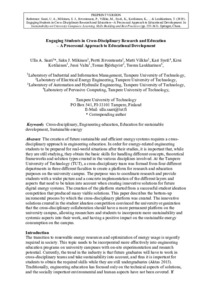Engaging students in cross-disciplinary research and education : a processual approach to educational development
Saari, Ulla A.; Mäkinen, Saku J.; Järventausta, Pertti; Vilkko, Matti; Systä, Kari; Kotilainen, Kirsi; Valta, Jussi; Björkqvist, Tomas; Laukkarinen, Teemu (2019)
Saari, Ulla A.
Mäkinen, Saku J.
Järventausta, Pertti
Vilkko, Matti
Systä, Kari
Kotilainen, Kirsi
Valta, Jussi
Björkqvist, Tomas
Laukkarinen, Teemu
Teoksen toimittaja(t)
Leal Wilho, Walter
Bardi, Ugo
Springer International Publishing AG
2019
Julkaisun pysyvä osoite on
https://urn.fi/URN:NBN:fi:tty-201907051943
https://urn.fi/URN:NBN:fi:tty-201907051943
Kuvaus
Peer reviewed
Tiivistelmä
The creation of future sustainable and efficient energy systems requires a cross-disciplinary approach in engineering education. In order for energy-related engineering students to be prepared for real-world situations after their studies, it is important that, while they are still studying, they obtain the basic skills for handling different concepts, theoretical frameworks and solution types created in the various disciplines involved. At the Tampere University of Technology (TUT), a cross-disciplinary team was formed from four different departments in three different faculties to create a platform for research and education purposes on the university campus. The purpose was to coordinate research and provide students with a wider picture and a concrete implementation of the different layers and aspects that need to be taken into account when creating innovative solutions for future digital energy systems. The creation of the platform started from a successful student ideation competition that produced many viable solutions. This paper describes the bottom-up incremental process by which the cross-disciplinary platform was created. The innovative solutions created in the student ideation competition convinced the university organization that the cross-disciplinary collaboration should have a more permanent platform on the university campus, allowing researchers and students to incorporate more sustainability and systemic aspects into their work, and having a positive impact on the sustainable energy consumption on the campus.
Kokoelmat
- TUNICRIS-julkaisut [16944]
